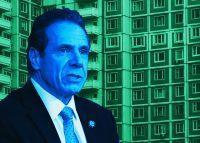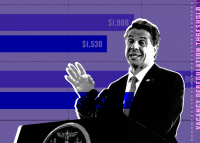 Cuomo says NY “took care of rent issue,” but has no policy in place
Cuomo says NY “took care of rent issue,” but has no policy in place
Trending
New York pols want to extend eviction moratorium
The bill would not waive or cancel rent, as other legislation has sought to do

Three progressive politicians are seeking to prevent a “tidal wave” of evictions when housing court re-opens.
New York State Sens. Brad Hoylman and Liz Krueger and Assembly member Jeffrey Dinowitz are proposing legislation that would extend New York’s three-month eviction moratorium for six months after the state of emergency ends.
The “Tenant Safe Harbor Act” would prevent landlords from seeking evictions for unpaid rent during that period. Landlords would still be able to bring claims for unpaid rent, but evictions for nonpayment would be effectively stalled.
The bill would not waive or cancel rent for tenants in financial distress as a result of coronavirus. The elected officials specified in a statement that other proposals to cancel rent do not apply retroactively, so their Tenant Safe Harbor Act is intended to serve as a stop-gap measure before any such legislation is passed.
New York State Sen. Michael Gianaris proposed a bill to forgive rent and mortgage payments for a 90-day period for those experiencing financial distress because of the coronavirus. But the bill did not make it into Gov. Andrew Cuomo’s final state budget, which was enacted last week. Few legislators voted against the budget, and Gianaris, the Senate deputy majority leader, was not among them.
Landlords and renters have received little direct relief, despite a surge of unemployment triggered by Cuomo’s stay-at-home order. In New York, there is already an eviction moratorium in place, and landlords who have federally backed mortgages can postpone their payments. Some landlords have voluntarily decided to cancel rent payments, but rent and mortgage payments are still due for many.
As a result, lenders, landlords and tenants are working out payment plans on a case-by-case basis, according to sources, with at least one top multifamily lender offering relief to some borrowers. Others who have not worked out such arrangements are preparing for a drop-off in rents, while some tenants across the nation gear up for mass nonpayment of rent.
Read more of our coverage on housing policy amid the global health crisis
 Cuomo says NY “took care of rent issue,” but has no policy in place
Cuomo says NY “took care of rent issue,” but has no policy in place
 Cuomo’s executive order tells banks to give homeowners a break
Cuomo’s executive order tells banks to give homeowners a break
 Landlords brace for impact of pandemic
Landlords brace for impact of pandemic
 Cuomo suspends foreclosures and mortgage payments
Cuomo suspends foreclosures and mortgage payments




